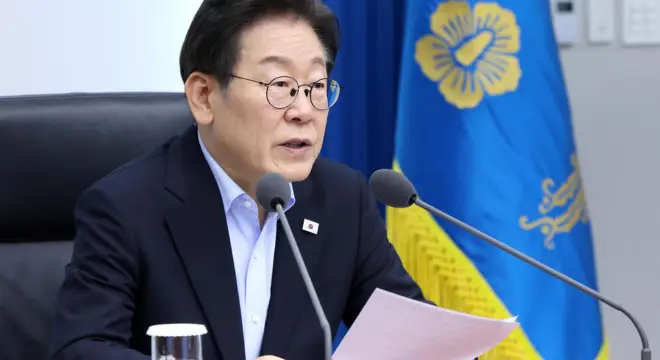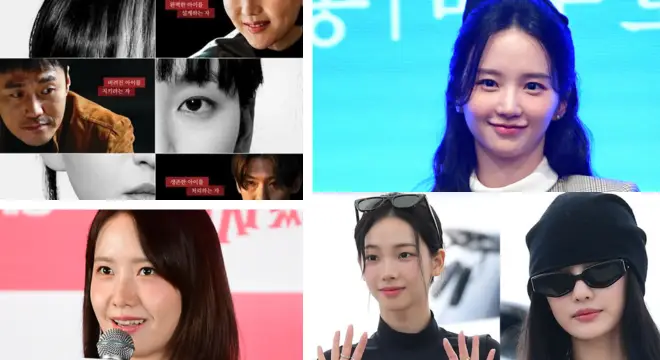|
Getting your Trinity Audio player ready...
|
What is the reason for President Lee Jae Myung’s recent turnaround in approval ratings after falling for several weeks? Is it a mix of successful economic policy, international diplomacy and, possibly, personal relationship with the public? How much of an effect did President Lee’s appearance over the Chuseok holiday have on public opinion?
After three weeks of falling approval, President Lee is now back up to 53.5%, according to a Realmeter survey conducted for Energy Economy News. That’s a 1.5-point increase from last week, while disapproval dropped by 0.8 points to 43.3%.
The rebound follows a number of clearly visible policy wins and more positive developments, from President Lee’s historic partnership with OpenAI to a successful summit with Prime Minister Fumio Kishida of Japan. In addition, President Lee’s Chuseok activities and presence in the media vis-a-vis those activities would have played an even larger role in connection with the public.
For now, let’s explore the various reasons why this approval has changed in a favorable direction.
Poll Details and Methodology
The Realmeter poll surveyed 2,017 adults nationwide from September 29 to October 2, 2025, targeting voters aged 18 and over. The poll results show:
- Approval rating: 53.5% (+1.5)
- Disapproval rating: 43.3% (−0.8)
- Margin of error: ±2.2 percentage points at 95% confidence level
- Response rate: 4.9%
Comparative Insights:
The National Barometer Survey (NBS) conducted during the same period reported a slightly higher approval of 57% indicating minor variations across different polling agencies.
Party Support Breakdown:
- Democratic Party: 47.2% (+3.9)
- People Power Party: 35.9% (−2.4)
- Rebuilding Korea Party: 3.3%
- Reform Party: 2.8%
- Progressive Party: 1.0%
- Undecided: 30%
The gap between the two major parties has widened to 11.3 percentage points, the largest lead for the Democratic Party in three weeks, indicating changes in public political opinion.
Key Factors Behind the Rebound
Analysts point to five critical factors that contributed to President Lee’s renewed popularity:
- Diplomatic Success:
President Lee’s summit with Japanese Prime Minister Fumio Kishida was widely regarded as a step forward in Korea-Japan relations, reinforcing his image as a capable and strategic leader on the international stage. - Tech and Innovation Partnerships:
The signing of a memorandum of understanding (MOU) with OpenAI positioned South Korea as a key player in global technological innovation and demonstrated Lee’s forward-thinking leadership. - Economic Performance:
Positive economic indicators strengthened public confidence:
- The KOSPI index surpassed 3,500 points, signaling market optimism.
- Exports rose steadily, boosting investor and public confidence in South Korea’s economic trajectory.
- The KOSPI index surpassed 3,500 points, signaling market optimism.
- Domestic Policy Initiatives:
Lee’s emphasis on price stabilization and senior employment policies resonated with voters, particularly older demographics, reinforcing his commitment to domestic welfare. - Crisis Management:
Following a fire-induced shutdown of the national IT network, Lee’s swift apology and order for a full investigation were perceived as decisive leadership, reassuring citizens that the government could handle emergencies effectively.
Cultural and Media Impact
Through culture, President Lee and First Lady Kim Hea Kyung engaged in an effort to solidify their public persona.
- They visited their hometown Andong, North Gyeongsang Province, taking time away from the residence during the Chuseok holiday to meet with citizens on a fairly personal level.
- Their appearance on JTBC’s “Chef & My Fridge” special Chuseok episode attracted a record Nielsen Korea rating of 8.9%, making it the highest rated episode since the show’s premiere in 2014.
- In 2015, a Big Bang episode garnered 7.4%, showcasing the heightened interest in television with Lee.
This exposure provided citizens with a figure familiar, family-oriented, and in touch with citizens – positively influencing public opinion.

Comparative Context
President Lee’s approval rating fell 4 points from 56% in early September to 52%, then increased to 53.5% following the Chuseok holiday. Experts surmise that his “great messaging for Chuseok,” prompt crisis mitigation, and “standout economic success” played a role in this positive change.
A raise in approval rating from 52% to 53.5% may indicate that some voters were comforted by Lee putting together policy distribution, diplomatic progress, and visible leadership into a multi-faceted perception of leadership.
Broader Political Landscape
The approval rebound also reflects broader shifts in South Korea’s political dynamics:
- The Democratic Party’s lead widened to 11.3 percentage points, the biggest gap in three weeks.
- The People Power Party faces challenges due to internal divisions and backlash over U.S.-Korea tariff negotiations.
- On domestic policy debates:
- 4.5-day workweek proposal: 32% support, 63% oppose
- Tariff talks with the U.S.: 55% opposed direct cash incentives
- 4.5-day workweek proposal: 32% support, 63% oppose
These factors illustrate that while Lee’s personal approval has risen, public opinion remains complex on broader political and economic issues.
Public Perception and Expert Analysis
- Many citizens praised Lee for transparency, accountability, and calm crisis management.
- His Chuseok video message and media appearances portrayed a grounded, sincere leadership style.
- Political analysts note that his approach resonates particularly well with older and moderate voters, who value steady governance and pragmatic decision-making.
Conclusion
After a rebound in approval ratings, President Lee Jae Myung is entering a phase of consolidation for his administration. The rise in his popular support has come from a blend of economic performance, diplomatic engagement, and media exposure, which have contributed to a revival of public confidence in his administration.
Whether or not this momentum will continue depends on sustained economic performace, effective implementation of domestic policies, and ongoing media exposure that links the President’s leadership with citizens. Nonetheless, the recent increase in his ratings indicates that thoughtful actions along with tactical media and public engagement can certainly change public perception in South Korea’s political system.


